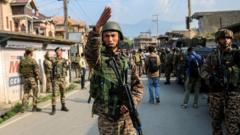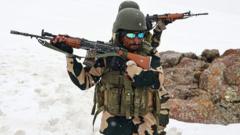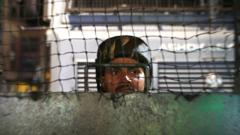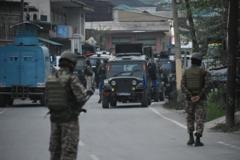In retaliation for a militant attack that left 26 civilians dead, India has executed "Operation Sindoor," striking alleged terrorist sites across the border. Pakistan condemns the strikes as unprovoked aggression, while both sides report civilian casualties and escalating tensions in the historically conflicted region.
Tensions Escalate as India Conducts Airstrikes on Pakistan-Administered Kashmir

Tensions Escalate as India Conducts Airstrikes on Pakistan-Administered Kashmir
Following a deadly attack on tourists in Kashmir, India has launched a series of airstrikes targeting Pakistan and Pakistan-administered Kashmir, igniting a renewed conflict between the two nations.
In a dramatic escalation of military tensions, India has conducted a series of airstrikes targeting Pakistan and Pakistan-administered Kashmir, following a deadly militant attack on tourists in Indian-administered Kashmir that occurred on April 22. The Indian defense ministry launched “Operation Sindoor,” asserting it was committed to holding responsible parties accountable for the attack, which took the lives of 25 Indians and one Nepali national. The operation's announcement comes after weeks of rising tensions between the two nuclear-armed neighbors.
Pakistan has rejected India's claims, stating that it had nothing to do with the attack and describing the Indian strikes as “unprovoked.” Prime Minister Shehbaz Sharif condemned the military action, stating that such an “act of aggression will not go unpunished.” According to reports from the Pakistani military, five Indian aircraft and a drone were shot down amid the strikes. While Indian officials confirm at least 10 civilians were killed by retaliatory shelling, Pakistan’s officials report a higher toll of 26 killed and 46 injured from the strikes.
India asserts that its operations targeted what it labeled "terrorist infrastructure" and reinforced that no military facilities were hit, emphasizing that their actions were "focused, measured, and non-escalatory." The targeted areas included significant sites in Muzaffarabad and Kotli in Pakistan-administered Kashmir, as well as Bahawalpur in the Punjab province. Conversely, Pakistan's Defense Minister Khawaja Asif disputes India's claims, asserting that civilian areas were impacted, challenging the narrative of targeting terrorist camps.
The backdrop to this escalation includes the April attack on tourists in Pahalgam, where witnesses reported that militants were deliberately targeting Hindu men. This incident marked one of the deadliest attacks on civilians in the region in the past two decades and coincided with heightened hostilities resulting in diplomatic expulsion and visa suspensions between the two countries.
Historically, Kashmir has served as a flashpoint between India and Pakistan since their partition in 1947, with both nations claiming the region in full but governing only parts. The conflict has seen extensive militarization, armed insurgency, and has been exacerbated by previous military operations and airstrikes ignited by earlier attacks such as the 2016 Uri attack and the 2019 Pulwama bombing.
As tensions soar, international leaders, including UN Secretary General Antonio Guterres and former U.S. President Donald Trump, have urged restraint to prevent escalating violence. With both governments engaged in actions that could further escalate the conflict, the global community remains alert to the potential ramifications should the situation deteriorate further.





















